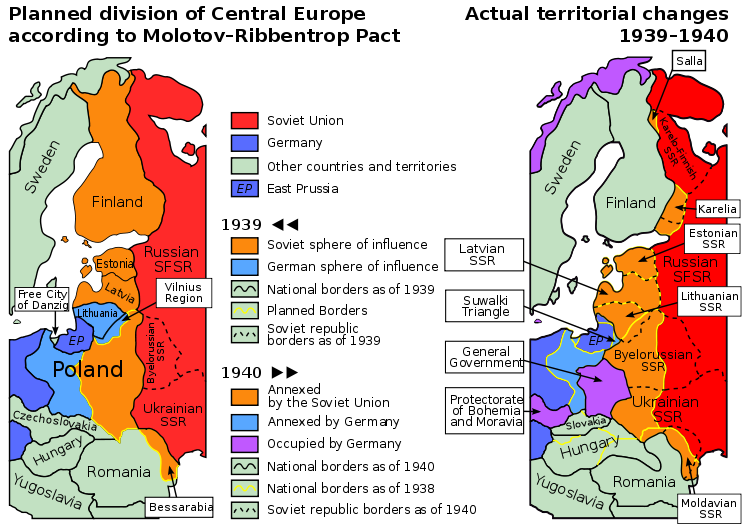In regards to the French government, they had been informed well in advance by their ambassador in Berlin. The following is extracted directly from the French Yellow Book (my emphasis), a compendium of French diplomatic documents from 1938-1939:
No. 123
M. COULONDRE, French Ambassador in Berlin,
to M. GEORGES BONNET,
Minister for Foreign Affairs.
Berlin, May 7, 1939.
I TAKE the liberty of drawing the especial attention of Your
Excellency to the information contained in the enclosed report, our
informant being in a particularly good position to know the intentions
of the Führer and of his principal lieutenants. His new declarations
may be summed up as follows:
(1) M. Beck's speech will in no way
alter the situation. The Führer is determined to secure the return of
Danzig to Germany, as well as the reunion of East Prussia to the
Reich.
(2) The Führer is patient and cautious, and will not tackle
the question in a direct way, for he knows that in future France and
Britain would not give way, and that the coalition which he would have
to confront would be too strong. He will go on manoeuvring until his
time comes.
(3) The Führer will come to an understanding to this
effect with Russia. The day will come when he attains his aims by
these means, without the Allies "having any reason, or even any
intention, to intervene." It may be that we shall witness a fourth
partition of Poland. In any case, "we shall soon see that something is
brewing in the East."
(4) The equivocal attitude of Japan has
contributed to Herr Hitler's orientation towards the U.S.S.R.
(5)
When the Polish question has once been settled, and Germany's military
supremacy definitely assured, Germany will be in a position to come to
a conference.
...
In my opinion, he may hope to draw advantage from it in three different ways:
(1) By arriving at a more or less tacit agreement with the U.S.S.R. which would assure him of the benevolent neutrality of that country in the event of a conflict, perhaps even of her complicity in a partition of Poland.
(2) By bringing, through the mere threat of a better understanding with the U.S.S.R., pressure simultaneously to bear on Japan and on Poland, in order to induce the former to sign a military alliance, and the latter to agree to the concessions he is asking for.
(3) By bringing the Western Powers, under the threat of collusion between Germany and Russia, to accept certain Soviet demands to which Poland and Rumania would be opposed, and thus to sow discord among the Allies.
And, In The Gathering Storm Churchill writes (in Chapter 20, The Soviet Enigma):
From the moment when Molotov became Foreign Commissar, he pursued a
policy of an arrangement with Germany at the expense of Poland. It was
not very long before the French became aware of this. There is a
remarkable dispatch by the French Ambassador in Berlin, dated May 7
[1939], published in the French Yellow Book, which states that on
his secret information he was sure that a Fourth Partition of Poland
was to be the basis of the German-Russian rapprochement.
Churchill goes on in that chapter with extensive quotations from Parliament's debate on May 19 [1939] directly addressing the need to form a binding mutual-defense pact with the Soviet Union before Germany did, in order to secure British and French interests in Eastern Europe, in regards to both Poland and Rumania. Both his own and Lloyd George's words are featured prominently.
To conclude the chapter, Churchill notes that, following Molotov's speech on May 19th in rebuttal to Chamberlain's speech in the House of Commons earlier that day:
.... All four countries [Finland, Estonia, Latvia, Lithuania] now refused [an offer of mutual defense and support from the Soviet Union against German aggression], and perhaps in their terror would for a long time have refused, such a condition [the Soviet demand for a guarantee from all its Eastern European neighbours]. Finland and Estonia even asserted that they would consider such a guarantee extended to them without their consent as an act of aggression. On that same day, May 31, Estonia and Latvia signed non-aggression pacts with Germany. ....
It seems clear that al parties concerned, even the victims, were aware of Russian intentions - any that accepted Hitler's bond need merely have noted the value of that bond to Czechoslovakia for an assessment of its worth.
